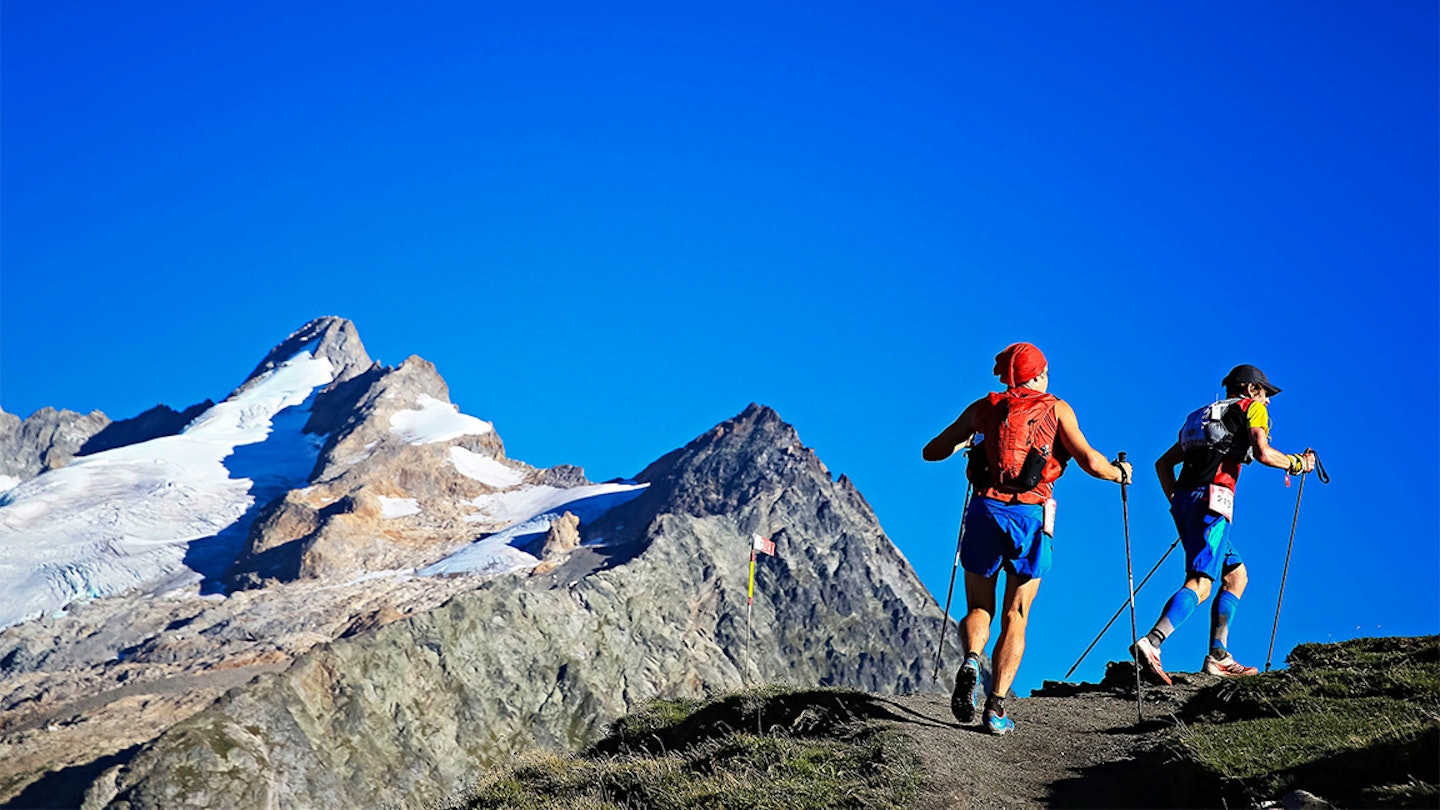You might have run a marathon before, or maybe you're finally ready to that that leap in distance. But if you've never run a long-distance off-road race, then you'll need to do some specific training to prepare yourself for the terrain and different muscles you'll be using during a mountain marathon.
This 10-week mountain marathon training plan brought to you as part of the Run 1000 Miles Challenge will focus in on building your endurance, hill strength, and get you used to running over varying terrain. When it comes to the mountains, your choice of trail running shoe is also very important. Look for a shoe with good grip over rocky terrain, some padding against sharp and hard ground, as well as being lightweight and agile for the hills.
How to run your first mountain race

When you reach the lofty running goal of a trail marathon, a lack of fitness won’t necessarily be an issue, so you’ll need to look at other areas. An ability to run uphill will be handy, although running down is probably the trickier skill to learn. That's becuase it requires some concestration as you plant your foot down to maximise grip, particularly on slippy ground. Short, fast strides with your feet landing close to your hips are also crucial. While your arm movements are quite controlled for hills, for downhill running the opposite is true.
You’ll also be looking to improve core strength, ankle mobility and an understanding of terrain. Descending at speed is all about having an understanding of how your brain can instantly calculate the best landing position for your foot, and having the confidence to plant it.
Success will involve getting the small things right right, then building on that. For instance, don’t expect to run trails at the same pace as road races – slow it down and focus on your technique. You should be upright with relaxed shoulders, and looking ahead rather than down at your feet. Aim for a high cadence of over 170 steps per minute (count footsteps for 30 seconds and then double it) to avoid over-striding. Choose easy trails at first, to help build your confidence.
Your 10-week mountain marathon training plan

Mountain running is going to be all about tackling hills – up and down – effectively, so those workouts will be important. Equally, the best schedule will be one that includes a few weekends running in the hills for six hours or so (once you've built up to that). We also recommend fartlek, the training method of running as fast and slow as you please during your run – invented in a Swedish forest, it’s perfect!
Unlike shorter distances, pace won’t be on your mind. Stop and walk, have a coffee, take in the sights, and get yourself used to being out in the mountains, tackling the kind of terrain you’ll experience in a race like this. Training will also involve getting used to the gear you’ll need for such an adventure. We've already talked about shoes, but you should also find a running pack that works and a waterproof running jacket that can cope with the expected weather conditions. It all pays dividends.
Week one
Monday: Run 11km at an easy pace
Tuesday: Run 1 hour hard, accelerating final 20 minutes
Wednesday: Run 13km at an easy pace
Thursday: Run 3km hard, then 20 x short hill, then 3km hard
Friday: Rest
Saturday: Run 1 hour fartlek
Sunday: Run 16km easy, rolling terrain
Week two
Monday: Run 11km at an easy pace
Tuesday: Run 5km hard, then 4 x 2min, then 5km hard
Wednesday: Run 16km at an easy pace
Thursday: Run 6 x long hill (2-3 min long), descend at speed
Friday: Rest
Saturday: Run 1 hour fartlek
Sunday: Run 23km easy, rolling terrain
Week three
Monday: Run 11km at an easy pace
Tuesday: Run 5km hard, then 3 x 6min, then 5km hard
Wednesday: Run 16km at an easy pace
Thursday: Run 15 short hills (1 min long), descend at speed
Friday: Rest
Saturday: Run 1 hour fartlek
Sunday: Run 23km easy, rolling terrain
Week four
Monday: Run 11km at an easy pace
Tuesday: Run 8km easy
Wednesday: Rest
Thursday: Run 8km easy
Friday: Rest
Saturday: Run 45 min fartlek
Sunday: Long day in the hills, aim for time rather than distance
Week five
Monday: Run 5km at an easy pace
Tuesday: Run 8 x 3min with 1min rest
Wednesday: Run 16km at an easy pace
Thursday: Run 3km hard, then 20 x short hill, then 3km hard
Friday: Rest
Saturday: Run 1 hour fartlek
Sunday: Run 13km easy, rolling terrain
Week six
Monday: Run 11km at an easy pace
Tuesday: Run 1 hour hard, accelerating final 20 minutes
Wednesday: Run 16km at an easy pace
Thursday: Run 6 x long hill (2-3min long), descend at speed
Friday: Rest
Saturday: Run 1 hour fartlek
Sunday: Run 23km easy, rolling terrain
Week seven
Monday: Run 11km at an easy pace
Tuesday: Run 5km hard, then 3 x 5min, then 5km hard
Wednesday: Run 16km at an easy pace
Thursday: Run 15 short hills (1 min long), descend at speed
Friday: Rest
Saturday: Run 1 hour fartlek
Sunday: Run 29km easy, rolling terrain
Week eight
Monday: Run 8km at an easy pace
Tuesday: Run 8km hard
Wednesday: Run 13km at an easy pace
Thursday: Run 15 short hills (1 min long), descend at speed
Friday: Rest
Saturday: Run 1 hour fartlek
Sunday: Run 16km easy, rolling terrain
Week nine
Monday: Run 8km at an easy pace
Tuesday: Run 8km at an easy pace
Wednesday: Run 10km at an easy pace
Thursday: Run 6km at an easy pace
Friday: Rest
Saturday: Run 30 min fartlek
Sunday: Run 13km at an easy pace
Week 10
Monday: Run 5km at an easy pace
Tuesday: Run 3km at an easy pace
Wednesday: Rest
Thursday: Run 3km at an easy pace
Friday: Rest
Saturday: Rest
Sunday: Mountain marathon race!
Top image credit: UTMB
For all the latest news, tips and gear reviews, sign up to the Trail Running Newsletter.
This article is brought to you by the official Trail Running Run 1000 Miles Challenge.

